Annie's Lovely Choir By The Sea Read online
Page 2
‘I tried,’ says Stuart in a whiney voice. ‘I mentioned I’d like kids one day, just in passing, and you couldn’t get out of here fast enough. Remember?’
I do have vague memories of a conversation getting more intense than usual, finding it difficult to breathe properly and making some excuse about having to go.
‘And when I suggested that we visit my family at Christmas you said you couldn’t go to Dartmoor because you’re allergic to the countryside.’
‘I am,’ I protest. ‘I get sneezy and my eyes run if there’s too much grass.’ I snap the Toblerone in two and watch chocolate shavings cascade onto the beige carpet, unsettled that Stuart has me pegged as family-phobic. He might be right, of course, though I do want to have children and a family one day. Well, probably. But not for ages.
Stuart gives a heavy sigh.
‘Face it, Annie, you’re allergic to commitment and you prefer being on your own. So I’m doing you a favour by ending things now before they get too serious.’
‘That’s rich. You’re getting off with Melinda behind my back and you’re doing me a favour? And it’s not true that I prefer being alone.’
‘Really? You only want to meet up on set days each week, and you’ve got hardly any of your stuff here even though you often stay over.’
‘It’s normal for couples to want to spend time on their own.’ Isn’t it?
He grabs my hands and holds on fast when I try to pull away.
‘You’re a free spirit, Annie, and that’s great. I admire how you’re making your own way in life and you don’t need anyone, but I want something different. We can still be friends though, can’t we?’
And he kisses me on the cheek while I try to remember where he keeps his scissors.
Chapter 3
It’s three o’clock on Saturday afternoon and, rather than spending the day with Stuart, I’m eating my own weight in pretzels while watching a box set of The Bridge.
There are three reasons why life traumas trigger a Scandi-noir box set binge:
concentrating on subtitles clears the mind;
I bloody love Saga, The Bridge’s autistic heroine who gets by on her own; and
though this probably sounds nuts, I reckon one of the more mature male actors might just be my dad.
I’m convinced my dad is Scandinavian, so who’s to say that he didn’t go on to find fame and fortune in Denmark as a TV actor after knocking up my mother at a music festival in the mid-eighties?
I’m not daft. I know there are like a million men in Scandinavia and my dad is more likely to be working in an office than on TV. But I’m still fascinated by Scandi dramas which feed an alternate fantasy life that runs through my head; a life filled with bleached wood and snow and uncluttered homes straight out of the IKEA catalogue.
Mum never confirmed that the man who impregnated her was Nordic but she once referred to him as a Viking and often told me I was the only one in the family with bright blue eyes. So I’ve constructed a story about my heritage based on that. The rest of me is pretty nondescript: thick shoulder-length brown hair that goes frizzy in wet weather, pale complexion, not terribly tall, size twelve in jeans. But people have always remarked on the vibrant colour of my eyes.
I’ve had to take it on trust that I’m the only blue-eyed Trebarwith because I’ve never met another member of my family. Not one, apart from Mum, and I like it that way because it means there are no stressful Christmases spent with warring relatives, and no trying to find the perfect birthday present for a stroppy sibling.
Now Mum’s gone, there’s just me which suits me fine except on days like today when being alone feels a bit sad.
‘Not out with Stuart, then?’ My flatmate Amber plonks down next to me on the sofa. She’s ten years younger than me and at university doing media studies.
‘No, we split up.’
‘OMG!’ exclaims Amber, searching through her pockets for her mobile that’s just dinged with a text. ‘That’s a bummer ’cos he was hot. Are you OK about it then?’
‘Not really, I—’
‘OMFG!’ squeals Amber, her eyes fixed on her mobile screen. ‘Siobhan has got tickets for us to see Beyoncé at the O2 and she’s like my favourite person of all time. That’s totally sick! Lauren will go mental ’cos her dad’s getting married to some random woman the same day so she can’t come.’ She glances across at me. ‘What did you say about Stuart? Are you all right about it?’
‘Yes, fine,’ I lie, while Amber does her Happy Dance round the room, totally blocking Saga who’s kicking some bloke’s arse.
By the time Amber leaves to meet up with Siobhan, I’ve heard more than I ever wanted to know about Beyoncé’s general awesomeness, and Lauren’s stepmum-to-be who’s a right bitch, apparently. But the flat’s too quiet without Amber so I listen to my break-up playlist on Spotify. Yep, I’m such a loser I’ve created my very own playlist for occasions such as this because the magical power of music can soothe a broken heart. But today even Sinatra and Streisand aren’t cutting it and I try another episode of The Bridge instead.
Being without a job and boyfriend has never really bothered me before but this time it’s hitting home. Maybe it’s because there’s a significant birthday looming or because I got closer to Stuart than was sensible. I’m upset about what happened and I’ll miss him when I stop feeling so angry with him. But I also feel relieved, as if I’ve escaped from something scary, so maybe Stuart was right when he said I don’t need anyone.
‘Yay, girl power!’ I say to the empty room, pumping my fist and feeling rather pathetic.
I wish I could talk to someone about how I’m feeling but, when I scroll through the contacts list on my phone, there’s no one I can call. I’ve got friends from my various jobs over the years, people like Maura. But they’re all busy these days with partners or kids and they can’t drop everything to suit me.
Putting the TV on pause, I sit in silence for ages as the penny drops that I’m heading for thirty and I’m not the most important person in the world to anyone. Now that Mum has gone and my friends are drowning in responsibilities, I’m completely on my own, although… reaching across to my handbag, I pull out the envelope and smooth out the letter inside. It’s on headed paper from a solicitors’ practice called Jasper and Heel in Penzance.
Globules of grease have made the paper transparent in places, and the writer’s surname has been obliterated by a smear of something that looks disgusting. But I can still make out what the letter says:
Dear Miss Trebarwith,
I am contacting you on behalf of Mrs Alice Gowan, your maternal great-aunt. Mrs Gowan is keen to have urgent contact with you and requests that you visit her to make her acquaintance. I have enclosed a cheque to cover the cost of your journey.
Mrs Gowan lives at Tregavara House in Salt Bay, Cornwall. She understands that you may be surprised to hear from her which is why she has asked me to act as an intermediary. If you are able to visit Mrs Gowan, please call me on the phone number above as soon as possible and I will liaise with her to arrange a convenient date and time.
Yours sincerely,
Elliott J.
My maternal great-aunt Mrs Alice Gowan – a woman I never knew existed until her solicitor’s letter dropped onto my doormat. Mum never mentioned her and wouldn’t speak about her family. They were shadowy figures when I was growing up; ghosts who inhabited a place far away. All Mum did say, after having a few too many, was that her parents had thrown her out after discovering she was pregnant so she’d travelled from Cornwall to London to make a new life. And it was a good life mostly, except on the days when Mum would sit and cry for hours until I got scared.
Her family have never had anything to do with us, so why now? I rub my fingers across the Jasper and Heel cheque and wonder what I should do. Visiting Mrs Gowan would feel disloyal to Mum but I can’t help being curious. The letter has opened a hidden doorway and I’m tempted to step through it. And I’m lonely. There, I’ve finally admitted it. Being independen
t is all very well but it’s a bugger when you can’t find a friend in your hour of need.
I glance at the blonde woman frozen on my TV screen. What would Saga do, if she could step out of the telly in her leather trousers and advise me? She’d tell me to call Elliott whatever-his-name-is and find out what’s going on, though of course she would say it in Swedish so I wouldn’t understand a word.
I’m about to make a life-altering decision based on imaginary advice from someone who doesn’t really exist. But I pick up my mobile, dial the number for Jasper and Heel and leave a message before I can change my mind.
Chapter 4
A dank mist is hanging over the village below me. Gulls are wheeling overhead calling mournfully to one another and the sea looks like a sheet of cold, grey steel. Welcome to Cornwall, also known as the Cornish Riviera apparently. People are really taking the piss!
The main thing I’ve noticed about Cornwall is that it’s wet. I’m used to London rain that washes the streets clean and freshens the air. But this is something else; a curtain of endless drizzle that seeps through coat seams and soaks you to the bone.
Even my socks are soggy, and I’m seriously regretting my choice of footwear. Ankle boots are ideal for the flat streets of Stratford but they’re not so great when trying to keep upright on a potholed road which is almost vertical, as if it’s been carved out of a frigging cliff. It’s so steep the taxi driver refused to take me down into the village, saying he valued his gearbox. So he abandoned me here in the middle of nowhere, stumbling towards houses huddled around a harbour far below.
There’s a tang of salt on the breeze and a faint boom from the waves which are crashing into the grey harbour wall, sending plumes of sea-spray high into the air. On the more sheltered side of the harbour, the water is churning about and brightly coloured fishing boats are lurching violently. I’m so busy watching the boats sway back and forth, I don’t notice a pothole which catches the back of my foot, snapping off my heel with a sharp crack and sending it skidding across the road into a hedge. Fantastic! Now I’m dripping wet and hobbling.
I stumble on down the mountain, cursing myself for coming to this godforsaken place and vowing to head home once I’ve discovered why Mrs Gowan sent for me. Her solicitor Elliott gave nothing away when we spoke on the phone. All he kept saying in a husky voice – obviously thinking he was being sexily mysterious rather than knobbishly annoying – was that everything would be explained when Mrs Gowan and I met. If I had a job and a boyfriend, I’d have told him and Mrs Alice Gowan to bugger off. But I’m fancy-free and, though I hate to admit it, curious about this stranger who shares my DNA. Even if she is part of the family that turned its back on my mum.
The houses are getting closer when I hear the growl of a car coming up fast behind me on the narrow road – really fast. Just in time, I flatten myself against the hedgerow as a battered black Mini hurtles past. It misses me but its front wheel bumps into a rain-filled pothole and a wall of dirty water arcs over the rusty roof and splats onto my head. Like Taylor Swift doing the charity ice bucket challenge, except she looked drenched but gorgeous and I look like a cat that’s been thrown into a bath head-first.
‘You idiot!’ I yell, picking up a stone and hurling it. There’s a clunk as the stone hits metal – oops, my aim is usually rubbish – and the car screeches to a halt and reverses at speed. It stops next to me and the driver leans across and winds down the passenger window. He’s about my age and wearing a Clash sweatshirt, which reminds me of Stuart.
‘Did you just throw a stone at my car?’ Raindrops are splattering onto the passenger seat and the dark-haired man winds the window up halfway. ‘What are you, a complete moron?’
I swipe aside my fringe which is plastered to my forehead and dripping into my eyes.
‘I’m sorry, I didn’t mean to hit your car but didn’t you see me? You almost knocked me over and you drenched me when you went past.’
‘You shouldn’t have been walking on the road.’
‘Don’t be ridiculous. Since when has it been a crime to walk on the road?’ I say those words confidently though maybe it is against the law here. The whole place is weird enough. And it’s obviously against Cornish law to be polite to strangers and offer them a lift when it’s peeing down.
The driver gesticulates wildly over my shoulder. ‘There’s a footpath over there – just over the hedgerow. You should be using it! Any idiot can tell that the road isn’t safe.’
‘How am I supposed to know about the footpath when there aren’t any signs telling me it’s there? I’m from London where we know how to put up signposts and motorists don’t drive like dickheads.’
Which isn’t strictly true because I’ve had several near-death experiences courtesy of dickhead drivers racing through red lights. But right now I don’t care about the truth. I’m tired and hungry, it’s taken me hours to get here, and what I want more than anything is to go home. Back to cliff-free, drizzle-free, wanker-driver-free civilisation.
‘Ah, I get it,’ smirks the man. ‘I thought you weren’t from around here. You emmets are all the same, acting like you own the place!’
‘Don’t call me an emmet,’ I shout through the endless rain. I’m not quite sure what an emmet is but it can’t be good. ‘You almost knocked me over and soaked me in the process. I wish I’d never come to Cornwall.’
‘I suggest you bugger off back to precious London then,’ yells the man, crunching his car into gear and screeching off into the distance. The Mini disappears round a bend while I send up a quick prayer to the gods: please don’t let him be related to me.
I hobble on down into the valley, keeping my spirits up by singing show tunes and thinking of new marketing posters for the county. ‘Visit Cornwall: the Ratsarse Riviera in the Back of Beyond.’ The local tourist board wouldn’t like it, but at least they wouldn’t get visitors here under false pretences.
When I eventually reach the village, yellow lamplight is glowing from cottage windows and piercing the gloom. The cottages are brown granite or painted white with rough, bumpy walls. They look like doll’s houses, with tiled roofs and climbing plants trailed around their front doors. Some are grouped together around a small green and there’s a narrow river meandering past the houses toward the sea.
It’s chocolate-box pretty but the place is like a ghost town so I poke my head round the door of a small shop selling newspapers, fruit and… plastic sunglasses. The shop owner must have a good sense of humour.
‘Excuse me, I‘m looking for Tregavara House.’
‘What will you be wanting there, then?’ asks the middle-aged woman behind the counter, looking up from her copy of OK! magazine.
‘I’m looking for Mrs Alice Gowan.’
‘Is that right?’
‘She's expecting me.’
The woman raises her eyebrows and points along the road. ‘You’d better carry on the way you’re going, then. Her house is set back near the cliffs. It’s the last one in the village so you can’t miss it. If you end up in the sea, you’ve gone too far.’ She chuckles at her own joke and crosses her arms under her huge chest. ‘Tell her Jennifer says hello and I’ll have her magazine in tomorrow if she feels well enough to call in for it.’
She comes to the door and watches me hobble on, past a church for the smallest congregation in the world. The ancient building is so dinky it must be a squeeze if more than fifty people turn up at the same time, and the churchyard is equally small and packed with weathered stones, pock-marked with green lichen. Maybe my ancestors are buried here, but most of the stones I can see have been scoured blank by decades of wind and rain so it’s impossible to tell.
Beyond the churchyard is a house with white-framed windows and a porch overhanging the black front door, held up by two thin stone pillars. The house is larger than the cottages in the village and behind it the land slopes up steeply towards towering cliffs which drop into the sea. This must be Tregavara House. It looks weathered and neglected – the gard
en is untidy and window frames are peeling – but it’s a handsome house, made of grey stone which mirrors the sky.
All of a sudden I’m nervous and it takes all my courage to open the rusted iron gate and walk through the garden. A large shrub near the front door has been blown flat by the wind and the metal bell-pull crunches with salt when my fingers close round it.
A bell clangs deep inside the house and, just as I’m starting to think no one is in, the door swings open.
‘Hello. Mrs Gowan?’
Much to my surprise, the woman nods. Mrs Gowan is not what I was expecting. ‘Great-aunt’ to me says small, round and cuddly with a tragic grey perm, but the woman in front of me is tall and slim with a shock of straight, white hair falling to her shoulders. She looks like a stern headmistress who’s just discovered me snogging behind the bike sheds.
‘You must be Annabella. You’d better come in.’ The scary woman pulls the door wide and, with a gulp, I step past her into a narrow, flagstoned hallway. ‘My, you are wet, aren’t you? Stay there.’ She disappears through a doorway at the end of the hall and returns with a fluffy blue hand towel. ‘Here! You’d better hang your coat up and come and sit by the fire. Try not to drip everywhere.’
I hang my coat on a wooden coat stand and it drips onto the floor while I pull off my boots and put my socks across a huge iron radiator which is only lukewarm. Mrs Gowan watches me without a word and then beckons for me to follow her across the cold stones into a sitting room where a fire is blazing. She gestures for me to take a seat on one side of the tiled fireplace and she sits opposite, with her back to a large stone-framed window. Behind her I can just make out the sea roiling against the dark harbour wall and I shiver.
‘Do you need a blanket?’
‘No thank you, Mrs Gowan. I’ll be fine when the fire warms me up.’
‘You’d better call me Alice.’ The flames cast shadows on her wrinkled skin as she picks up a silver bell from a side table and rings it. ‘I’ll get you a hot drink.’

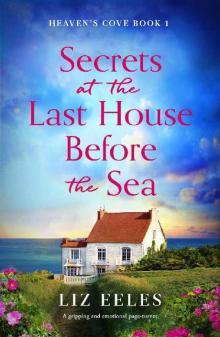 Secrets at the Last House Before the Sea
Secrets at the Last House Before the Sea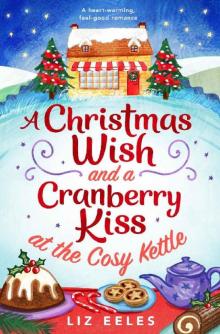 A Christmas Wish and a Cranberry Kiss at the Cosy Kettle: A heartwarming, feel good romance
A Christmas Wish and a Cranberry Kiss at the Cosy Kettle: A heartwarming, feel good romance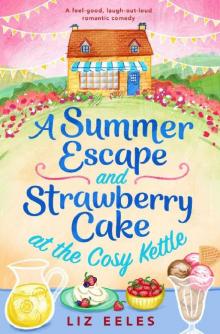 A Summer Escape and Strawberry Cake at the Cosy Kettle: A feel good, laugh out loud romantic comedy
A Summer Escape and Strawberry Cake at the Cosy Kettle: A feel good, laugh out loud romantic comedy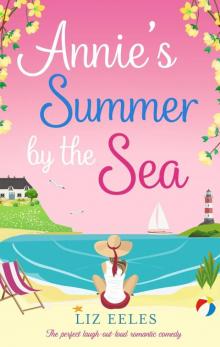 Annie’s Summer by the Sea: The perfect laugh-out-loud romantic comedy
Annie’s Summer by the Sea: The perfect laugh-out-loud romantic comedy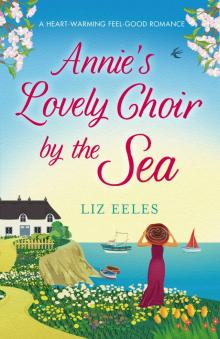 Annie's Lovely Choir By The Sea
Annie's Lovely Choir By The Sea